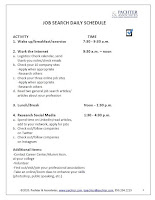The world is falling apart, so why bother looking?
I was just laid off. I’m too shocked to do anything.
Why look for a new job? There is nothing but the virus out there.
If you have avoided looking for work during the coronavirus pandemic, you are not alone. As the comments above -- culled from my coaching sessions -- illustrate, many people have not started their job search, or are approaching it in a half-hearted way.
I understand. The pandemic has really shaken the business world as millions of jobs have been lost. It is a difficult time to look for work, and it’s easy to think, “Why bother?”
But there are openings. Some businesses are hiring.
Earlier this month, LinkedIn stated that more than 180,000 people had recently been hired through its connections, and in May the United States added 2.5 million jobs. Do not give up. Job seekers who are persistent and determined are more likely to succeed.
Here are 10 suggestions to help you in your search:
1. Update your resume and social-media sites. This should be among the first things you
do. Your resume may not be current, as you weren’t planning to be unemployed. Add any new jobs, promotions, activities, awards, or additional studies. There are lots of online resources that may help. Google “resume writing” and you will find numerous examples of ways to structure your information. Or hire a professional resume writer. You may need to create more than one resume, depending on the types of jobs you are seeking.
2. View your search as a full-time job. Since you are unemployed, you need to use the time you would have spent at your old job looking for a new one. Yes, I do mean 9 to 5! Of course, you can be kind to yourself and take a longer lunch break and a day off occasionally. But the bottom line is this: At the end of the day, you want to feel that you worked. (If you are taking odd jobs to help make ends meet, your day gets even more complicated.)
3. Have a quiet, dedicated work space. This is the place where you keep your job-search materials, and do your searching. If you have young children at home because of the pandemic, this may be harder to achieve. Get creative. One man I know took over half of the dining room table.
4. Create a daily work schedule. List the activities you need to do. This makes it more likely you will actually do them. Some of these activities include:
--Checking online job sites, such as indeed.com or simplyhired.com
--Checking the websites of companies you want to work for – many companies list job openings
--Spending time on LinkedIn, applying for jobs, and connecting with your network
--Reading articles on the web about conducting a job search
--Taking an online class to enhance your skills
--Allowing time to exercise! Yes, build that into your schedule, too
5. Respond to openings quickly. You don’t want your application to get lost in the shuffle. Many people may apply, and you want your resume to be one of the first to arrive. This makes it much more likely to be reviewed.
6. Stay in touch with your colleagues and network. Let people know you are looking. More people get jobs through networking than any other way. Your friends, colleagues, acquaintances, and friends of friends can’t help you unless they know you’re looking.
7. Participate in your professional associations. Though you may not be able to network in person, you can still interact with other professionals online through virtual training, conferences, and networking events. For example, my son’s professional association recently held a “Cocktails, Conversation, & Connections” Zoom meeting.
8. Be prepared to interview via video conferencing. In addition to preparing answers to questions you think you may be asked, you need to prepare to present yourself professionally online. Know how to use the technology. Practice. Position yourself in front of a neat, uncluttered, and quiet setting. Be aware of what others will see behind you. Make sure there are no controversial objects in bookshelves or on the wall. Dress appropriately – as though you were being interviewed in person. Your location needs good lighting. You want to be seen clearly, without any shadows hiding your appearance.
9. Use your college career center. Though most centers have suspended in-person meetings, they still provide many resources, including reviewing resumes, holding virtual workshops, and posting job openings.
10. Be a resource for others. Let other job seekers know if you learn of openings that might be suitable for them. When you help others, they are more likely to help you.
Pachter & Associates provides seminars and coaching on business etiquette, presentation skills, career advancement, professional presence, and business writing. For additional information, please contact Joyce Hoff at Joyce@pachter.com. (www.pachter.com)








